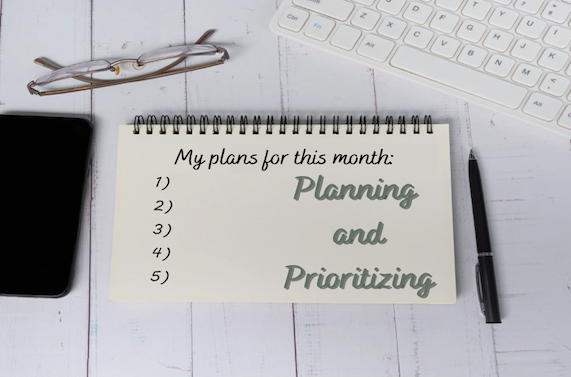
Written by Jennifer Cox LCPC
Let’s talk about Planning and Prioritizing, another Executive Function.
The ability to:
-Create a plan to reach a goal
-Complete small tasks that lead to the overall goal
-Make decisions about what should be focused on at that moment
People with ADHD often struggle with planning and prioritizing tasks, which can have a significant impact on their daily lives. Planning and prioritizing are essential skills for managing time, organizing, and completing tasks efficiently. However, individuals with ADHD may find it challenging to organize their thoughts and create a structured plan. They may struggle with:
1. Time management: Difficulty estimating how long tasks will take, so one may underestimate the time needed to complete them. This makes it challenging to allocate the appropriate amount of time towards each task. This can lead to a lack of time for priorities and increase one’s stress.
2. Procrastination: Due to difficulties with focus and attention, individuals with ADHD may struggle with getting started on tasks, leading to last-minute rushes, stress, and poor quality work.
3. Getting easily distracted: Individuals with ADHD often have a high level of distractibility, which can make it challenging to stay focused on one task at a time. This can lead to difficulty prioritizing tasks and a tendency to jump from one task to another without completing any of them.
4. Impulsivity: One may act impulsively, not thinking through the consequences of their actions which can lead to a lack of consideration for long-term goals and a tendency to prioritize immediate gratification over important tasks. This can make it challenging to stick to a plan or follow through with tasks.
5. Difficulty prioritizing: There may be difficulties distinguishing between urgent and non-urgent tasks, struggling to determine which ones are most important and need to be done first, which can result in a lack of progress on important projects and being overwhelmed.
6. Organization: Organizing thoughts and materials doesn’t always come easy which makes it difficult to create a structured plan. Keeping track of deadlines, appointments, and responsibilities can be challenging. One may struggle with maintaining a structured schedule and often misplace important items or forget important dates.
The impact of these difficulties in planning and prioritizing can be significant. It can lead to increased stress, missed deadlines, poor academic/work performance, and strained relationships. However, with appropriate strategies and support, individuals with ADHD can learn to improve their planning and prioritizing skills.
Some strategies that can help include:
1. Breaking tasks into smaller, manageable steps: Breaking down larger tasks into smaller, more achievable steps can make them feel less overwhelming and easier to prioritize.
2. Create a to-do list: Making a list of tasks can help individuals with ADHD visualize their responsibilities and prioritize them accordingly.
3. Using visual aids and reminders: Visual aids, such as calendars, to-do lists, and reminders, can help one stay organized and remember important tasks and deadlines, helping one prioritize.
4. Setting realistic goals and deadlines: This can help one manage their time more effectively and reduce the likelihood of procrastination. Setting deadlines can also provide a sense of urgency and help individuals with ADHD prioritize their time effectively.
5. Seek support: Working with a therapist or coach who specializes in ADHD can provide valuable guidance and support in developing effective planning/prioritizing strategies.
It’s important to remember that ADHD affects each individual differently, and what works for one person may not work for another. Finding personalized strategies and seeking professional help can greatly improve the ability to plan and prioritize effectively, leading to a more productive and fulfilling day.
Understanding each of the executive functions and how they can impact your day to day, can help one understand why ADHD is a serious disorder – This is a disorder that involves self-control, self-care, self-regulation, and self-motivation to get through your day.
For more information or help with executive functioning, contact 815-363-0864 or info@echcounseling.com

